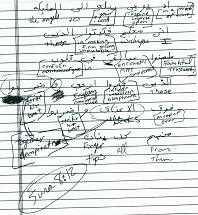I haven't done any translation for a while so this looked like fun and I sat down for a while to hash it out. Here it is in a more accurate, and therefore rougher translation (as best as my skills are still able to accomplish):
Then your Lord impressed upon the angels: I [am] with you. In making those faithful firm I shall bring across in conflict [with] those infidels fear. Strike over the necks and strike from them all fingertips.Of course, even this is cleaned up some. There are several problems in translating Arabic.
Sura 8:12
First, this is Quranic Arabic and it does not track with modern Arabic, even modern standard Arabic. There are slightly different spellings, slightly different words, slightly different vowel markings - all of which make translation harder. There are several words in this passage which are recognizable but would not be considered the correct form if a modern Arabic newspaper editor was proofing an article.
Second, not having a common basis with English, words quite often do not translate directly. For instance the word above translated as "conflict" also has connotations of "overthrowing of the government."
Third, Arabic has no punctuation. True, many modern Arabic publications have adopted western-style periods, question marks, etc. However, the Quran was obviously written long before this. They did use a letter marker to indicate the beginning of a new sentence; basically the tacking on of an "f" before a word indicated a new sentence. The translation relied upon in the Slate article does not seem to follow this, probably because while it sacrifices accuracy it makes for a more coherent translation.
Forth, idioms cause problems. My trusty old Arabic dictionary informs me that "strike the neck" means to decapitate. However, the language in the passage does not track exactly in that it talks of striking them "over" or "on top" of the necks. As well, I am always concerned that an accepted interpretation of the Quran which is well established and permeates the society (but could have developed long after the writing) drives the idiom rather than following it. Still, considering that the immediately following passages calls for the striking fingertips off, decapitation does seem to be what is meant by the passage.
Click on the small picture below and a larger picture of the translation in work will come up. Remember, Arabic reads from top to bottom right to left. The Arabic is above and the possible translations are below. You'll see that several words have a number of possible translations which often leads to a number of different translations:


1 comment:
Oh no! Are you saying that the simple translations bandied about in the media and in popular culture of the Koran might not be as nuanced as can be? This is bad. I will have to forget all of the rhetoric about Muslims that they made me memorized. However, I won't be able to march in the July 4th brigade chanting "Islam is a complicated religion" because it just doesn't flow.
Post a Comment